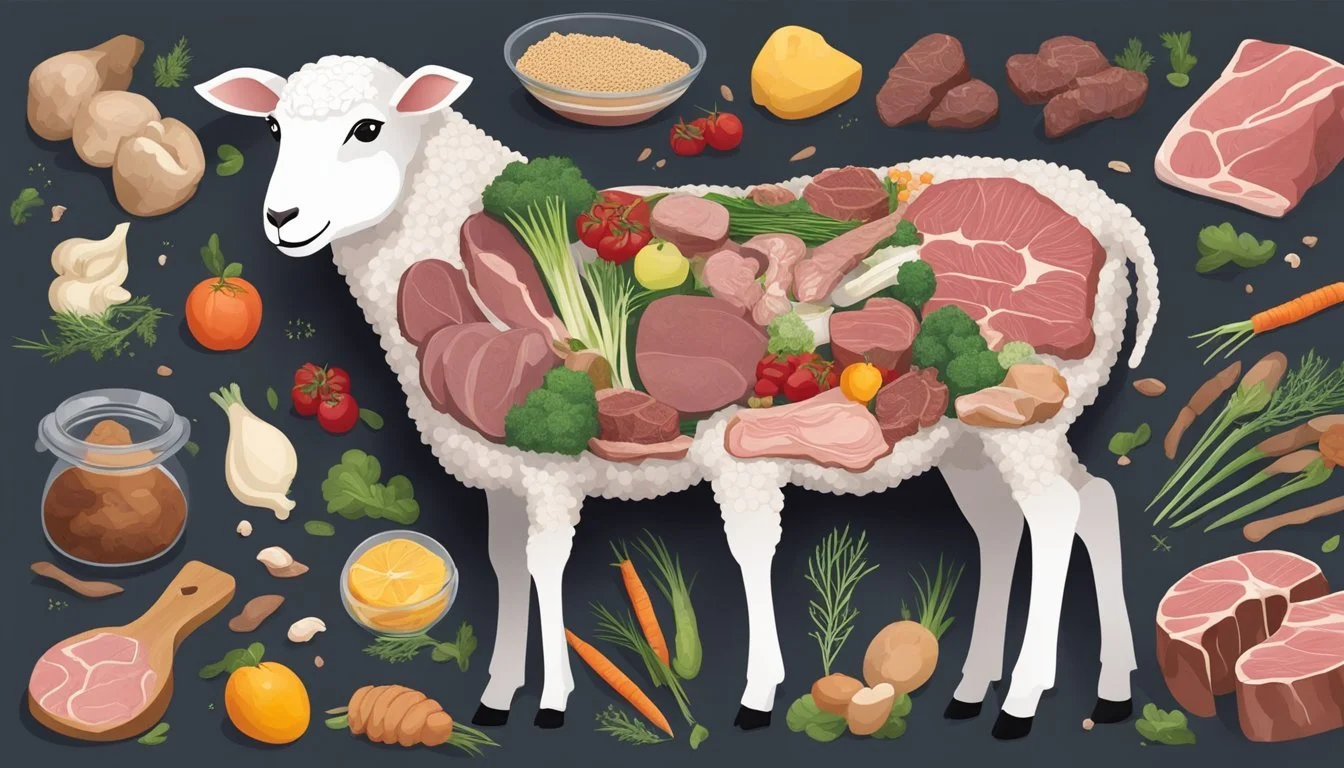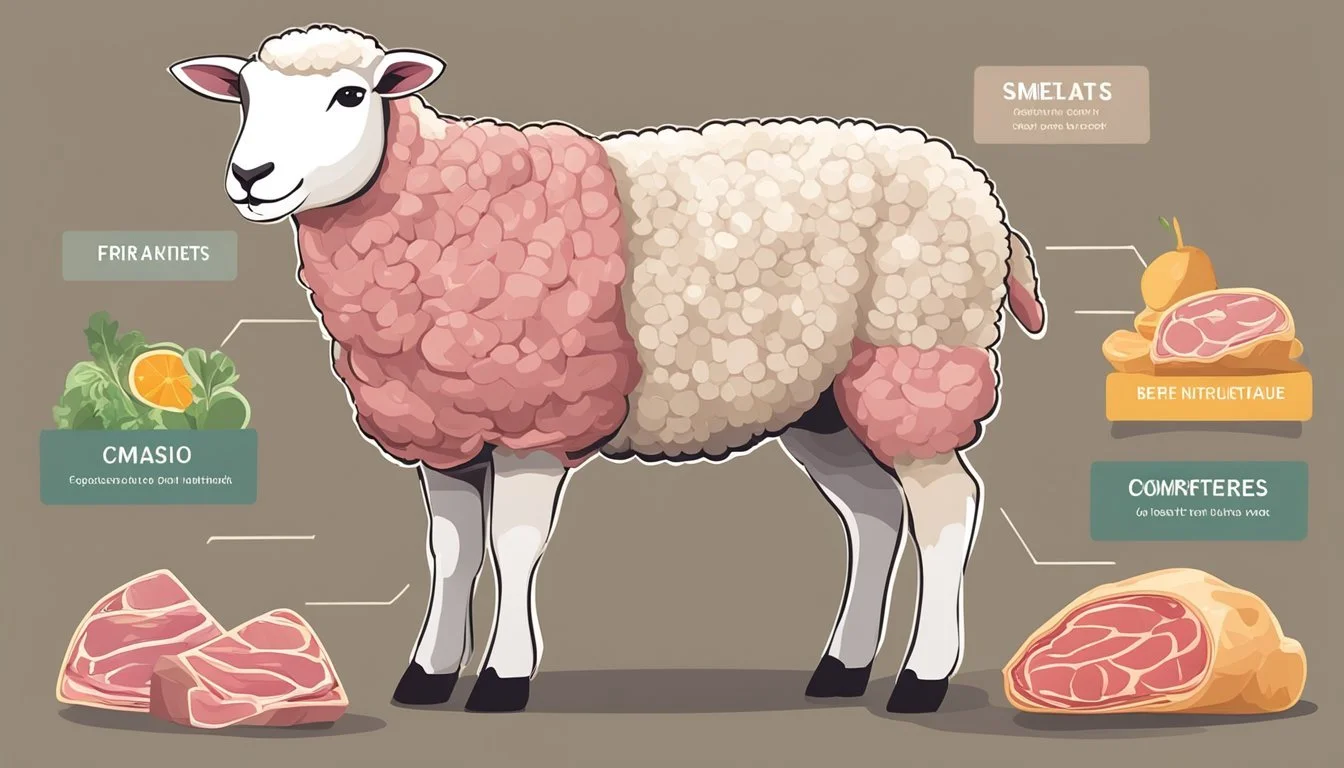Lamb Nutritional Value Carnivore Diet
Benefits and Key Nutrients
Lamb is a highly nutritious option for those following a carnivore diet, providing a rich source of essential nutrients. It consists mainly of protein and fat, two macronutrients crucial for energy and muscle maintenance. A 100-gram serving of lamb offers approximately 25 grams of protein and 15 grams of fat, along with vital minerals such as iron, zinc, and phosphorus.
Iron assists in oxygen transport within the blood, zinc supports immune system function and wound healing, and phosphorus promotes bone health. These nutrients make lamb a valuable addition to an animal-based diet, which emphasizes the consumption of all types of animal meats, seafood, organs, eggs, and dairy products.
For those concerned with nutrient density, lamb stands out as a robust choice. Packed with vitamins and minerals along with its macronutrient profile, lamb can help meet the dietary needs of individuals on a carnivore diet. By incorporating lamb into their meals, they can ensure a balanced intake of the essential nutrients their bodies require.
Lamb as a Source of Nutritional Value
Lamb provides a rich source of protein, essential vitamins, and minerals, making it a valuable addition to the carnivore diet. This section covers the macronutrient content, vitamins and minerals, and the fat profile of lamb.
Macronutrients in Lamb
Lamb is an excellent source of high-quality protein, essential for muscle growth and repair. A 100g serving of lamb typically contains around 25g of protein. This protein includes all essential amino acids required for optimal bodily functions.
Lamb also contains about 17g of fats per 100g serving. It is nearly carbohydrate-free, making it suitable for a low-carb or carnivore diet. The high-protein and fat content provide sustained energy and satiety.
Vitamins and Minerals in Lamb
Lamb is rich in various essential vitamins and minerals. It is a significant source of Vitamin B12, which supports brain and nervous system health. Iron in lamb helps with oxygen transportation in the blood.
Other vitamins found in lamb include Vitamin B6, which supports metabolism, and niacin. Minerals such as zinc and selenium aid immune function and antioxidant defenses.
Fat Profile of Lamb
The fat content in lamb includes a mixture of saturated and unsaturated fats. Saturated fat contributes to about half of the total fat content. Specifically, a 100g serving of lamb can have around 8g of saturated fat.
These fats are crucial for various bodily functions, including hormone production. Lamb also contains healthy monounsaturated fats, which benefit heart health. The balanced fat profile provides both energy and essential fatty acids.
Benefits of Lamb in the Carnivore Diet
Lamb offers numerous advantages for those on the carnivore diet, providing high-quality protein, essential vitamins, and beneficial fats. This nutrient-dense meat supports muscle growth, energy levels, and overall health.
Protein Content and Muscle Growth
Lamb is a rich source of high-quality protein, essential for muscle growth and repair.
Each serving provides all essential amino acids, making it a complete protein source. Including lamb in the diet helps maintain and build muscle mass, especially important for those engaged in regular physical activity or strength training.
Protein also contributes to satiety, helping to control hunger and support weight management. The high biological value of lamb protein ensures efficient digestion and absorption, promoting optimal muscle function.
Vitamin B12 and Iron Content
Lamb is packed with essential nutrients like Vitamin B12 and heme iron, both crucial for maintaining health.
Vitamin B12 supports the proper functioning of the brain and nervous system, while also aiding in red blood cell formation. Adequate B12 intake from lamb ensures sustained energy levels and prevents deficiencies.
Heme iron, found abundantly in lamb, is highly bioavailable and easily absorbed by the body. It plays a crucial role in oxygen transport and supports energy production.
When it comes to getting the best deals, buying vitamin B12, online is the way to go!
Benefits of High Fat and Low Carbohydrate Intake
Lamb's high fat content, combined with its low carbohydrate profile, aligns perfectly with the carnivore diet principles.
These healthy fats are vital for heart health, hormone production, and providing a steady source of energy. The consumption of lamb helps maintain stable blood sugar levels, reducing the risk of insulin resistance.
Furthermore, the fat in lamb provides satiety, helping individuals feel full for longer periods. This can aid in weight loss and weight management by curbing overeating tendencies.
Lamb's nutrient density ensures that, despite a limited food choice on the carnivore diet, individuals receive an adequate intake of essential nutrients.
Preparing Lamb for the Carnivore Diet
Lamb is a versatile meat suited to various cooking techniques, each enhancing its rich flavor. Proper storage and food safety are crucial to maintaining its freshness and nutritional value.
Cooking Techniques
When preparing lamb for the carnivore diet, several cooking methods can maximize its taste and nutritional benefits. Roasting is ideal for larger cuts like lamb legs. Start by searing the meat at a high temperature to brown the outside, then reduce the heat for a slow roast to maintain juiciness.
For a quicker option, grilling lamb chops delivers tender, flavorful results. Preheat the grill, cook chops for a few minutes on each side, and let them rest to distribute juices evenly. Grilling enhances the rich flavor of lamb through caramelization.
Pan-searing smaller cuts, like lamb loin, offers a convenient method. Heat a pan to high, sear each side, then finish in the oven if thicker cuts are used. This technique ensures a crispy exterior with a tender center.
Storage and Food Safety
Proper storage of lamb ensures safety and preserves its quality. Refrigeration is crucial; raw lamb should be stored at 40°F (4°C) or lower and consumed within 3-5 days. If you need longer storage, freezing is an option. Wrap lamb tightly to prevent freezer burn and maintain its moisture.
Frozen lamb can be kept for up to 6-9 months. Thaw in the refrigerator to avoid bacterial growth, never at room temperature.
Maintaining cleanliness while handling lamb prevents contamination. Use separate cutting boards and utensils for raw lamb. Always wash hands before and after touching raw meat, ensuring a safe and healthy preparation process.
Comparative Analysis of Lamb to Other Meats
Lamb stands out nutritionally due to its rich composition of vitamins, minerals, and healthy fats. This section examines how lamb compares to beef, poultry, fish, and even plant-based protein sources.
Lamb vs. Beef and Other Red Meats
Lamb and beef are both excellent sources of protein and iron. For example, 100 grams of lamb provide approximately 25 grams of protein and 2.1 milligrams of iron, whereas beef offers a similar profile, but the iron content can vary.
Lamb is also rich in zinc and contains conjugated linoleic acid (CLA), which has been associated with various health benefits.
In contrast, beef tends to have more saturated fat, which might not be ideal for everyone. Both meats are nutrient-dense, but lamb's unique nutrient profile, including higher levels of certain fatty acids, makes it a beneficial choice for the carnivore diet.
Poultry, Fish, and Lamb
Poultry, such as chicken and turkey, provides a leaner source of protein compared to lamb. Chicken breast, for instance, contains lower fat content but doesn't offer the same amount of minerals like iron and zinc.
Fish, on the other hand, is an excellent source of protein and is rich in omega-3 fatty acids, which are beneficial for heart health. While lamb contains omega-3s, the levels are generally lower than what you'd find in oily fish such as salmon.
Lamb's higher content of certain vitamins and minerals, like zinc and CLA, offers different health benefits. The choice between these proteins depends on individual nutritional needs and health goals.
Lamb and Plant-Based Protein Sources
While the carnivore diet primarily focuses on animal meats, comparing lamb to plant-based proteins highlights interesting nutritional differences. Plant-based sources, such as lentils and chickpeas, provide dietary fiber and essential nutrients but lack certain vitamins found in lamb.
Lamb offers high-quality complete protein, which means it has all essential amino acids. Plant-based proteins often need to be combined to provide the same completeness.
For those on a carnivore diet, lamb's concentration of vitamins B12, iron, and CLA is particularly advantageous, something not matched by plant-based sources.
Nutritional Implications for Health and Wellness
The carnivore diet features lamb as a nutrient-dense option that can offer several benefits for both physical and mental health. The focus will be on how lamb chops and their nutritional components impact health, including muscle function, bone strength, and cognitive performance.
Impact on Physical Health
Lamb chops offer a rich source of protein, with around 25g of protein per 100g. Protein aids in muscle repair and growth, essential for physical health.
Minerals such as iron, zinc, and phosphorus are present in lamb chops. Iron supports oxygen transport in the blood, while zinc boosts immune function and wound healing. Phosphorus is crucial for bone health.
Additionally, lamb contains beneficial compounds like creatine, which enhances muscle mass and performance, and glutathione, a potent antioxidant that reduces oxidative stress.
Mental Clarity and the Carnivore Diet
Lamb contributes to mental clarity through its iron content, promoting efficient oxygen delivery to the brain. Adequate iron levels are linked to improved cognitive function.
This meat also supplies magnesium, which plays a role in neurotransmitter function and mood regulation. Proper magnesium levels can diminish feelings of anxiety and depression.
The carnivore diet, emphasizing nutrient-rich sources like lamb, may support mental clarity without the need for plant-based foods, which might be inflammatory for some individuals.
Glutathione found in lamb is also vital, as it protects against cellular damage and supports brain health. This can lead to clearer thinking and better cognitive performance.
Carnivore Diet Meal Planning with Lamb
When planning a carnivore diet, incorporating lamb can provide diversity and rich nutritional benefits. Lamb, especially when grass-fed or pasture-raised, offers high-quality protein and essential fats.
Stay organized with a simple yet diverse meal plan. Begin with breakfast. A lamb liver and egg scramble is a nutrient-dense option. Lightly season slices of lamb liver and sauté them in butter with eggs.
Lunch can feature lamb chops. Grilled or pan-seared lamb chops offer a satisfying and protein-packed meal. Add a side of bone marrow for extra flavor and nutrient richness.
For dinner, consider roasted leg of lamb. Slow-cooking the leg ensures tenderness and brings out deep flavors. Pair this with crispy pork cracklings for texture and additional healthy fats.
Including organ meats in the diet ensures a balanced intake of vitamins and minerals. Lamb organs, such as liver and heart, are nutrient powerhouses. They should be consumed regularly to boost iron, vitamins A and B12, and other crucial nutrients.
A sample meal plan for three days might look like this:
Day Meal Food Day 1 Breakfast Lamb liver and egg scramble Lunch Grilled lamb chops with bone marrow Dinner Roasted leg of lamb with pork cracklings Day 2 Breakfast Lamb sausages Lunch Lamb burger patties (grass-fed) Dinner Slow-cooked lamb shanks Day 3 Breakfast Lamb kidney with eggs Lunch Bison and lamb meatballs with butter Dinner Grilled lamb ribs and heart
Ensuring variety and including portions of organ meats will help in maintaining a comprehensive nutrient profile while following the carnivore diet.





